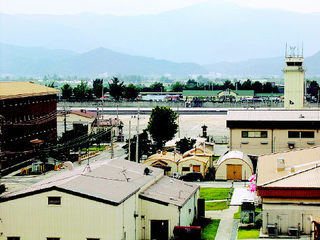 |
|
One of the U.S. bases to be returned to Korea
|
Ruling party plans to run query through National Assembly
The governing Uri Party plans to conduct a hearing and Assembly investigation into negotiations between Seoul and Washington over the sharing of environmental cleanup costs for U.S. military bases to be returned to South Korea.
Uri lawmakers said at a press conference on July 20 that the results of the government cleanup negotiations had been unilaterally favorable for the U.S. side. Depending upon the government’s reaction, they said, "we are going to hold a hearing on the level of the Unification, Foreign Affairs and Trade, and Environmental and Labor committees, as well as an Assembly investigation."
Rep. Choi Jae-cheon said that several Assembly committees decided to hold a closed-door hearing, deciding to "examine the environmental pollution of the U.S. bases through a bipartisan hearing."
According to the negotiation data disclosed by the legislators, the U.S. has a plan to clean up only five facilities out of 16 whose underground water is contaminated. The U.S. will use high-tech equipment to perform a process called ’Bioslurping.’ This technology is used mainly to clean up petroleum-contaminated underground water and it can lower almost half of the total petroleum hydrocarbon (TPH) level in six months.
Rep. Woo Won-shik stressed, however, that "the groundwater pollution at the remaining 11 bases is serious, as well." He continued, "We found that there is a petroleum layer of over 5 cm in the groundwater of Camp Gray at Tongjak-ku, one of four bases returned by the U.S. without undergoing the cleanup procedure. The government will have to shoulder a huge amount of money to clean up these other military facilities." Rep. Jung Sung-ho said that "the U.S. has conducted an investigation into environmental pollution of smaller bases." From now on, he said, larger bases, including Camp Hialeah in Busan, will be investigated, "but the South Korean government will have to pay most of the cleanup costs according to the present negotiations," he said.






